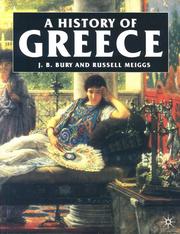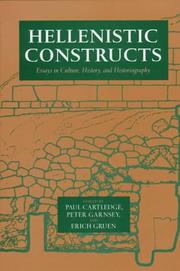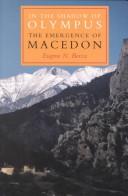| Listing 1 - 10 of 19 | << page >> |
Sort by
|

ISBN: 0333154924 0333154932 Year: 1975 Publisher: London : MacMillan,
Abstract | Keywords | Export | Availability | Bookmark
 Loading...
Loading...Choose an application
- Reference Manager
- EndNote
- RefWorks (Direct export to RefWorks)
938.08 --- History Ancient world Greece Hellenistic period (323-146 b.C.) --- Greece --- History --- -938.08 --- History of ancient Greece
Book
ISBN: 9782903189914 2903189919 2918887919 Year: 2007 Volume: 25 Publisher: Naples: Centre Jean Bérard,
Abstract | Keywords | Export | Availability | Bookmark
 Loading...
Loading...Choose an application
- Reference Manager
- EndNote
- RefWorks (Direct export to RefWorks)
This volume presents the results of the excavations conducted by the University of Copenhagen at Pontecagnano (Prop. Avallone), located some 8 km southeast of Salerno in the northern part (the Ager Picentinus) of the Sele Plain in Campania. The excavations revealed a part of the residential zone of the ancient town with two main phases of occupation, the first belonging to the late Classical/early Hellenistic period (second half of 4th to early 3rd century BC) and the second to the late Republican period (2nd to first half of 1st century BC). Both phases represent crucial periods in the history of Southern Italy. The first is a period of turmoil due to the Roman penetration southwards, while the second period falls after a period of crisis after the Second Punic War. The structures of the first phase form part of a general reorganization of the Etruscan-Campanian settlement and testify to a community of some wealth. A habitation unit provided with a stone-paved courtyard and polychrome stucco illustrates this. In the second phase the zone was only partly reoccupied. During Imperial times the area was frequented in a sporadic manner. The book adds considerably to our knowledge of the settlement of ancient Pontecagnano. It is the most complete work on a habitation context published so far, and it offers a fine selection of all groups of archaeological material from this important site.
Excavations (Archaeology) --- Fouilles (Archéologie) --- Catalogs --- Catalogues --- Pontecagnano (Italy) --- Pontecagnano (Italie) --- Antiquities --- Antiquités --- 937.7 --- History Ancient world Italy Southern Italy --- Fouilles (Archéologie) --- Antiquités --- Archaeological digs --- Archaeological excavations --- Digs (Archaeology) --- Excavation sites (Archaeology) --- Ruins --- Sites, Excavation (Archaeology) --- Archaeology --- Pontecagnano Faiano (Italy) --- Excavations (Archaeology) - Italy - Pontecagnano - Catalogs --- Pontecagnano (Italy) - Antiquities - Catalogs --- habitat --- Hellenistic period --- archaeology --- votive repository --- Roman period --- necropolis --- Fouilles archéologiques --- Italie
Book
ISSN: 16135628 ISBN: 9783447106559 3447106557 9783447195348 Year: 2016 Volume: 97 Publisher: Wiesbaden: Harrassowitz,
Abstract | Keywords | Export | Availability | Bookmark
 Loading...
Loading...Choose an application
- Reference Manager
- EndNote
- RefWorks (Direct export to RefWorks)
This book covers the history of Egypt between 404 BC and 305 BC. These are symbolic dates: the first one marked by the Persian empire losing control of Egypt to the native prince Amyrtaeus of the XXVIII dynasty, the second one by the coronation of Ptolemy I, who thus accentuated the beginning of a new Macedonian dynasty and the symbolic end of the Empire of Alexander the Great. From 404 until ca 340 BC Egypt stayed independent under the energetic pharaohs of the XXVIII-XXX dynasties, to reach its height of power during the reigns of Nectanebo I and Nectanebo II. In addition to accounts of classical authors, power and wealth of the pharaohs of the XXX dynasty are evidenced by their massive building program, as shown by the Catalogue of Buildings at the end of the book. Agnieszka Wojciechowska further shows the Second Persian Domination as a period of mostly military occupation contested by large parts of the population of Egypt who offered a more hospitable welcome to Alexander and his Argead successors. 0In its reconstruction of the history of Egypt this book attempts to go beyond accounts of classical authors, making use of Greek and Egyptian inscriptions, coins, papyri and archaeological evidence. Fourth century papyri, largely sale and marriage contracts and tax documents, show economic and everyday life almost undisturbed by warfare.
Geschichte 400 v. Chr.-300 v. Chr. --- Ägypten --- (Produktform)Paperback / softback --- (Zielgruppe)Fachpublikum/ Wissenschaft --- Alexander the Great --- Ancient Egypt --- Ancient Egypt Buildings --- Ancient Greece --- Classical Studies --- Hellenistic Period --- (VLB-WN)1553: Hardcover, Softcover / Geschichte/Altertum --- Ptolemaic dynasty, --- Egypt --- Egypte --- History --- Histoire --- Egypt - History - 332-30 B.C.
Book
ISBN: 3110444968 3110437325 3110444976 Year: 2015 Publisher: De Gruyter
Abstract | Keywords | Export | Availability | Bookmark
 Loading...
Loading...Choose an application
- Reference Manager
- EndNote
- RefWorks (Direct export to RefWorks)
Turkey's northern edge is a region of contrasts and diversity. From the rugged peaks of the Pontic mountains and hidden inland valleys to the plains and rocky alcoves of the Black Sea coast, this landscape shaped and was shaped by its inhabitants' ways of life, their local cultural traditions, and the ebbs and flows of land-based and maritime networks of interaction. Between 2009 and 2011, an international team of specialists and students of the Cide Archaeological Project (CAP) investigated the challenging landscapes of the Cide and Şenpazar districts of Kastamonu province. CAP presents the first systematic archaeological survey of the western Turkish Black Sea region. The information gathered by the project extends its known human history by 10,000 years and offers an unprecedented insight into the region's shifting cultural, social and political ties with Anatolia and the Circumpontic. This volume presents the project's approach and methodologies, its results and their interpretation within period-specific contexts and through a long-term landscape perspective.
Archaeology, Turkey, Black Sea, CAP, Cide, Senpazar, Anatolia, Prehistoric assemblages, Obsidian exchange networks, Bronze Age, Iron Age, Hellenistic period, Roman period, Byzantine period, Ottoman period, Pottery, Landscape archaeology, Petrographic study, Field methodology, Archaeological field survey. --- HISTORY / Ancient / General. --- Cide (Turkey) --- Turkey --- Black Sea Coast (Turkey) --- Antiquities. --- Aegialis (Turkey) --- Jidde (Turkey) --- Jiddeh (Turkey) --- Karaağaç (Turkey) --- Kara-Agach (Turkey)

ISBN: 0520918339 058516021X 9780520918337 9780585160214 0520206762 Year: 1997 Publisher: Berkeley, California : University of California Press,
Abstract | Keywords | Export | Availability | Bookmark
 Loading...
Loading...Choose an application
- Reference Manager
- EndNote
- RefWorks (Direct export to RefWorks)
The Hellenistic period (approximately the last three centuries B.C.), with its cultural complexities and enduring legacies, retains a lasting fascination today. Reflecting the vigor and productivity of scholarship directed at this period in the past decade, this collection of original essays is a wide-ranging exploration of current discoveries and questions. The twelve essays emphasize the cultural interaction of Greek and non-Greek societies in the Hellenistic period, in contrast to more conventional focuses on politics, society, or economy. The result of original research by some of the leading scholars in Hellenistic history and culture, this volume is an exemplary illustration of the cultural richness of this period. Paul Cartledge's introduction contains an illuminating introductory overview of current trends in Hellenistic scholarship. The essays themselves range over broad questions of comparative historiography, literature, religion, and the roles of Athens, Rome, and the Jews within the context of the Hellenistic world. The volume is dedicated to Frank Walbank and includes an updated bibliography of his work which has been essential to our understanding of the Hellenistic period.
Hellenism. --- Hellenism --- Greece --- Regions & Countries - Europe --- History & Archaeology --- Mediterranean Region --- Civilization. --- ancient greece. --- ancient history. --- ancient literature. --- asia history culture. --- athens. --- complex culture. --- culture ancient near east. --- essay collection. --- fascinating time period. --- greek societies. --- hellenistic history. --- hellenistic period. --- hellenistic scholarship. --- jewish history. --- judaism. --- rich culture. --- rome. --- sociology of the ancient world. --- world history.
Book
ISBN: 0520967917 9780520967915 9780520295001 Year: 2018 Publisher: Berkeley, CA : University of California Press,
Abstract | Keywords | Export | Availability | Bookmark
 Loading...
Loading...Choose an application
- Reference Manager
- EndNote
- RefWorks (Direct export to RefWorks)
Seers featured prominently in ancient Greek culture, but they rarely appear in archaic and classical colonial discourse. Margaret Foster exposes the ideological motivations behind this discrepancy and reveals how colonial discourse privileged the city's founder and his dependence on Delphi, the colonial oracle par excellence, at the expense of the independent seer. Investigating a sequence of literary texts, Foster explores the tactics the Greeks devised both to leverage and suppress the extraordinary cultural capital of seers. The first cultural history of the seer, The Seer and the City illuminates the contests between religious and political powers in archaic and classical Greece.
Prophets --- Oracles, Greek. --- Religion and politics --- History. --- Hero --- Greece --- Colonies. --- ancient greece. --- ancient greek politics. --- ancient world. --- antiquity. --- archaic greece. --- archaic. --- classical greece. --- classical world. --- classical. --- colonial discourse. --- colonial. --- colonialism. --- culture. --- delphi. --- divination. --- greek culture. --- greek politics. --- hellenistic period. --- ideological. --- ideology. --- literary analysis. --- literary texts. --- oracle. --- politics. --- religion. --- religious studies. --- seercraft. --- seers.
Multi
ISBN: 9781501739569 1501739565 Year: 2019 Publisher: Ithaca, NY : Cornell University Press,
Abstract | Keywords | Export | Availability | Bookmark
 Loading...
Loading...Choose an application
- Reference Manager
- EndNote
- RefWorks (Direct export to RefWorks)
First-person poetry is a familiar genre in Latin literature. Propertius, Catullus, and Horace deployed the first-person speaker in a variety of ways that either bolster or undermine the link between this figure and the poet himself. In I, the Poet, Kathleen McCarthy offers a new approach to understanding the ubiquitous use of a first-person voice in Augustan-age poetry, taking on several of the central debates in the field of Latin literary studies-including the inheritance of the Greek tradition, the shift from oral performance to written collections, and the status of the poetic "I-voice."In light of her own experience as a twenty-first century reader, for whom Latin poetry is meaningful across a great gulf of linguistic, cultural, and historical distances, McCarthy positions these poets as the self-conscious readers of and heirs to a long tradition of Greek poetry, which prompted them to explore radical forms of communication through the poetic form. Informed in part by the "New Lyric Studies," I, the Poet will appeal not only to scholars of Latin literature but to readers across a range of literary studies who seek to understand the Roman contexts which shaped canonical poetic genres.
Literature --- Latin poetry --- First person narrative --- Point of view (Literature) --- Self in literature --- History and criticism --- Theory, etc --- Horace --- Catullus, Gaius Valerius --- Propertius, Sextus --- Criticism and interpretation. --- First person narrative. --- Self in literature. --- Theory, etc. --- poetic address, lyric, Hellenistic period, Roman period, Latin poetry.
Book
ISBN: 9781501739552 1501739557 1501739565 1501739573 9781501739576 9781501739569 Year: 2019 Publisher: Ithaca [New York]: Cornell university press,
Abstract | Keywords | Export | Availability | Bookmark
 Loading...
Loading...Choose an application
- Reference Manager
- EndNote
- RefWorks (Direct export to RefWorks)
"First-person poetry is a familiar genre in Latin literature. Building on the Greek poetic tradition of performed poetry, Latin poets such as Propertius, Catullus, Horace, and Ovid positioned their speakers both as participants in the poem's narrative and as narrators standing outside the poem and shaping its discourse. This book offers a model for understanding the ubiquitous use of a first-person voice in Latin poetry, taking on several of the central debates in the field of Latin literary studies-- including the inheritance of the Greek tradition, the shift from oral performance to written collections, and the status of the poetic "I-voice"--through close readings of Catullus, Propertius, Horace, and (in the epilogue) Ovid. Moving beyond debates about how closely the textual speaker replicates the historical author, McCarthy analyzes poetic structure, showing how the poet draws the reader in by narrating scenes of address from which the reader is, paradoxically excluded, as if leaning in to listen to an overheard conversation"--
First person narrative. --- Latin poetry --- Point of view (Literature). --- Self in literature. --- History and criticism --- Theory, etc. --- Horace --- Horace. --- Catullus, Gaius Valerius --- Catullus, Gaius Valerius. --- Propertius, Sextus --- Propertius, Sextus. --- Criticism and interpretation. --- First person narrative --- Point of view (Literature) --- Self in literature --- Criticism and interpretation --- Latin poetry - History and criticism - Theory, etc. --- Horace - Criticism and interpretation --- Catullus, Gaius Valerius - Criticism and interpretation --- Propertius, Sextus - Criticism and interpretation --- poetic address, lyric, Hellenistic period, Roman period, Latin poetry.
Book
ISBN: 9780520253360 0520253361 0520290844 9786612463204 1282463209 0520943635 9780520943636 9781282463202 6612463201 Year: 2010 Publisher: Berkeley : University of California Press,
Abstract | Keywords | Export | Availability | Bookmark
 Loading...
Loading...Choose an application
- Reference Manager
- EndNote
- RefWorks (Direct export to RefWorks)
This landmark contribution to ongoing debates about perceptions of the Jews in antiquity examines the attitudes of Greek writers of the Hellenistic period toward the Jewish people. Among the leading Greek intellectuals who devoted special attention to the Jews were Theophrastus (the successor of Aristotle), Hecataeus of Abdera (the father of "scientific" ethnography), and Apollonius Molon (probably the greatest rhetorician of the Hellenistic world). Bezalel Bar-Kochva examines the references of these writers and others to the Jews in light of their literary output and personal background; their religious, social, and political views; their literary and stylistic methods; ethnographic stereotypes current at the time; and more.
Greek literature, Hellenistic --- Jews in literature. --- History and criticism. --- Juifs dans la littérature --- Littérature grecque hellénistique --- Histoire et critique --- Jews in literature --- History and criticism --- apollonius molon. --- bezalel bar kochva. --- discussion books. --- greek culture. --- greek history. --- greek intellectuals. --- greek literature. --- greek writers. --- hecataeus of abdera. --- hellenistic period. --- historical jews. --- history buffs. --- jewish culture. --- jewish people. --- jewish representation. --- jews in literature. --- literary references. --- literary style. --- literary. --- perceptions of jews. --- political views. --- religious backgrounds. --- religious history. --- rhetoric. --- scientific ethnography. --- social connections. --- stereotypes. --- theophrastus.

ISBN: 0691055491 0691215944 9780691055497 0691008809 Year: 1990 Publisher: Princeton (N.J.): Princeton university press,
Abstract | Keywords | Export | Availability | Bookmark
 Loading...
Loading...Choose an application
- Reference Manager
- EndNote
- RefWorks (Direct export to RefWorks)
In tracing the emergence of the Macedonian kingdom from its origins as a Balkan backwater to a major European and Asian power, Eugene Borza offers to specialists and lay readers alike a revealing account of a relatively unexplored segment of ancient history. He draws from recent archaeological discoveries and an enhanced understanding of historical geography to form a narrative that provides a material-culture setting for political events. Examining the dynamics of Macedonian relations with the Greek city-states, he suggests that the Macedonians, although they gradually incorporated aspects of Greek culture into their own society, maintained a distinct ethnicity as a Balkan people. "Borza has taken the trouble to know Macedonia: the land, its prehistory, its position in the Balkans, and its turbulent modern history. All contribute ... to our understanding of the emergence of Macedon ... Borza has employed two of the historian's most valuable tools, autopsy and common sense, to produce a well-balanced introduction to the state that altered the course of Greek and Near Eastern history.
Macedonia --- -Macedon --- History --- -Macedonia --- -History --- Makedhonia --- Makedonia --- Makedoniya --- Makedonja --- Macedon --- -Oudheid. --- Macedoniërs. --- Makedonien (Altertum) --- Europe --- Council of Europe countries --- Eastern Hemisphere --- Eurasia --- Oudheid. --- Aegae. --- Aeschines. --- Alexander I. --- Archelaus. --- Axios R. --- Boeotia. --- Brasidas. --- Caranus. --- Cassander. --- Cersebleptes. --- Diodorus Siculus. --- Epaminondas. --- Eumenes of Cardia. --- Florina. --- Gygaea. --- Hellenistic period. --- Heracles. --- Hesiod. --- Isocrates. --- Kotys (Cotys). --- Lefkadia. --- Makedones. --- Mardonius. --- Naousa. --- Olympia. --- Peloponnesian War. --- Persians. --- Salonica. --- Sitalces. --- Themistocles. --- Thermaic Gulf. --- Thrace. --- Vergina. --- Via Egnatia. --- World War II. --- Xerxes. --- Zeus. --- gold resources. --- inscriptions. --- minerals and mines. --- painting. --- -Makedonien (Altertum) --- Macedoine --- Histoire ancienne --- -Macedoine
| Listing 1 - 10 of 19 | << page >> |
Sort by
|

 Search
Search Feedback
Feedback About UniCat
About UniCat  Help
Help News
News